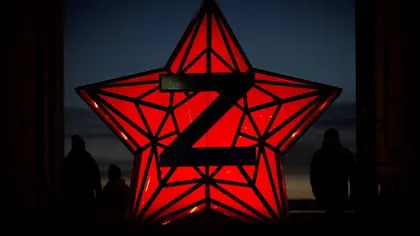Since launching its full-scale invasion of Ukraine last February, one of the few things that Russia has done with any level of consistent proficiency is lie.
The Kremlin has spouted nonsense too many times to count, carrying on its long tradition of issuing falsehoods, misinformation and general bizarreness that has been a hallmark of Vladimir Putin’s lengthy rule.
JOIN US ON TELEGRAM
Follow our coverage of the war on the @Kyivpost_official.
Kyiv Post has sifted through all of them to bring you the top five fundamental tenets of Russian propaganda that the Kremlin has relied upon in its attempt to justify its imperialistic landgrab.
- Obtain the most recent updates on the Ukraine situation today.
- Find the newest Ukraine news pieces that came out today.
1. The "special military operation"
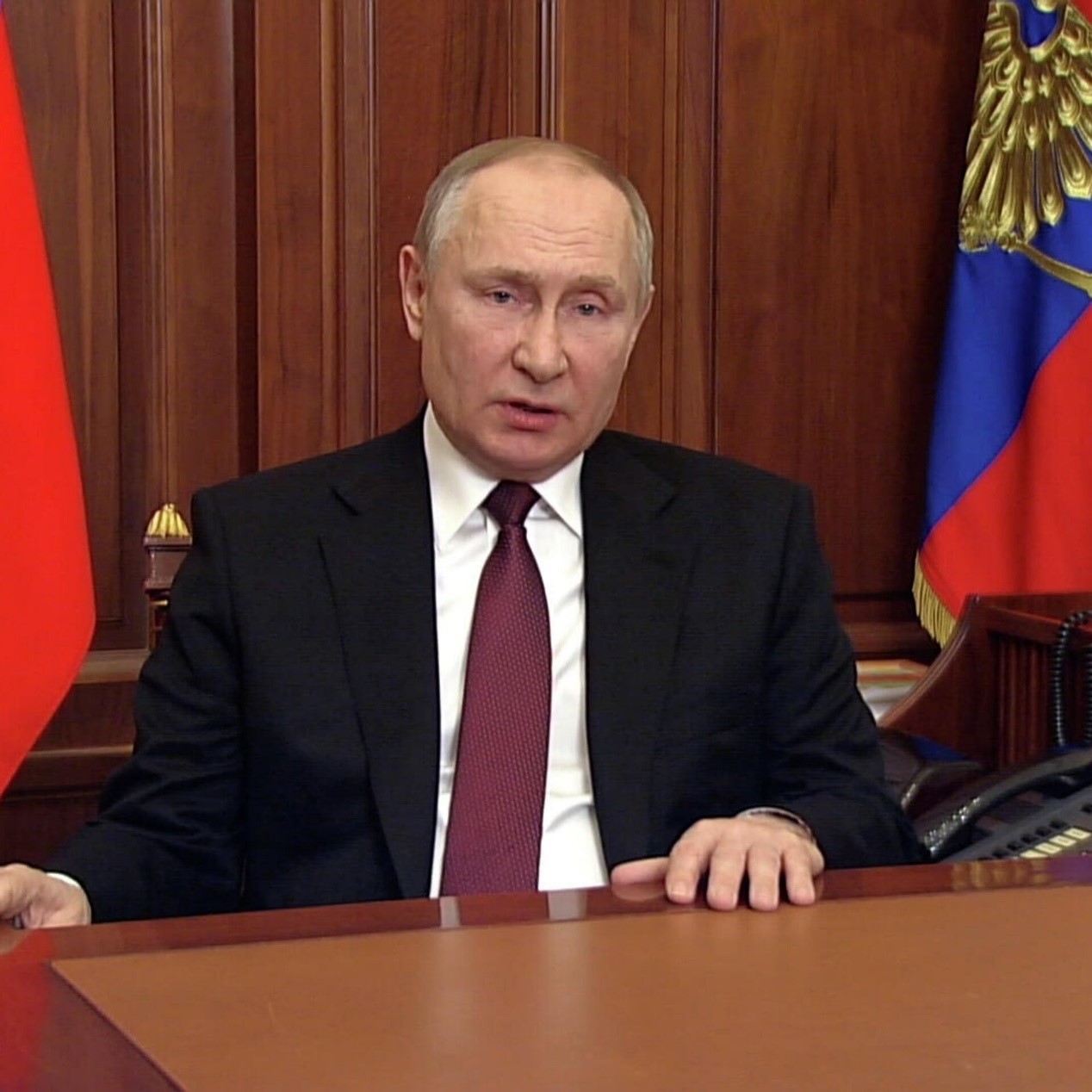
Russian President Vladimir Putin announced the "special military operation" on Feb. 24. Photo credit: RIA Novosti.
From the very beginning of Russian aggression against Ukraine, the Krelimn has denied ever even starting a war. From 2014, during the hybrid stage of its war (in eastern Ukraine), the Kremlin operated by using the concept of a so-called civil war: acknowledging the scale of the armed conflict, stating time and time again that it was a Ukrainian civil war and refusing to recognize Russia as a participant.
When Russian troops launched the full-scale invasion on Feb. 24 and Russian tanks and troops rolled across the border, the war became impossible to hide and a change in tack was required.
So, early in the morning of Feb. 24, instead of declaring war, Putin announced the launch of his "special military operation".

‘We Need to End That Horrible, Horrible War’ – Ukraine at War Update for Dec. 23
This obviously understated the scale of military action that was under way – an operation is quick, local, with limited forces, and not a protracted war against an entire nation.
The Russians had to believe that the "special military operation" would cost them little, that it was not aggression but a mission with specific goals.
But it didn’t quite go as planned, and what Russian military planners thought would last just a few days, is now into its 11th month.
In fact, Russia’s full-scale invasion is the largest war in Europe since World War II. Moreover, Russia has begun to suffer crushing defeats at the hands of the Armed Forces of Ukraine and was forced to declare mobilization due to huge losses.
2. The "demilitarization" of Ukraine
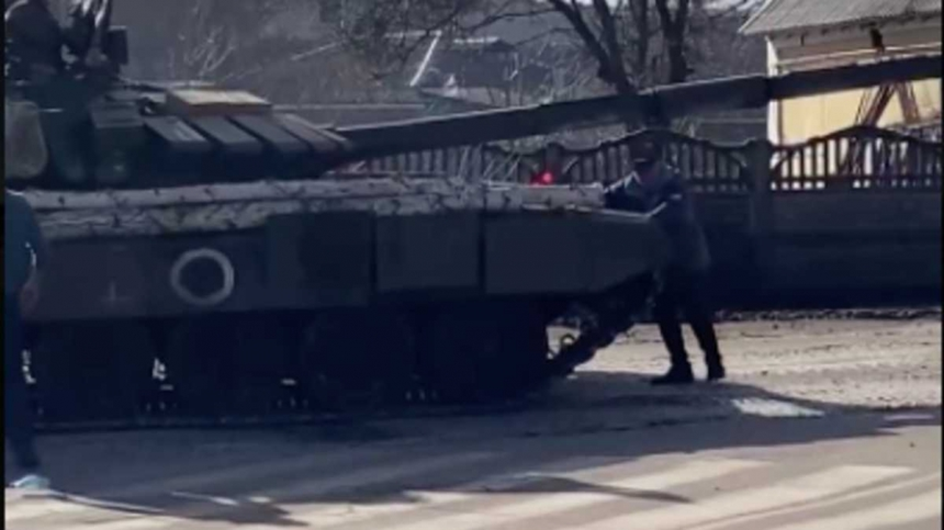
Local citizens in Bakhmach (Chernihiv Region) prevent Russian occupation tanks from advancing further. Photo credit: Telegram channel Realnaya voyna, Feb. 26.
An essential point of Russian propaganda is the stated goal of "demilitarizing" Ukraine. Demilitarization is based on the following Russian logic – because NATO-supported Ukraine would attack Russia first, the purpose of the so-called special operation is to demilitarize Ukraine and, in so doing, protect Russia.
In his speech on Feb. 24, Putin outlined this issue as the most crucial reason for the "special military operation" in Ukraine.
"The problem is that on territories adjacent to ours, and our historical territories, an 'Anti-Russia' [Ukraine] is being created, and placed under full external control, intensively settled by the armed forces of NATO countries and pumped full of the most modern weaponry.
"It is a real threat not just to our interests, but to the very existence of our state and its sovereignty," Putin underscored.
However, after the first days of Russia's full-scale invasion had passed, it became clear that Ukraine did not have sufficient weaponry and military capacity to both attack Russia and defend its territories.
In those first days, local Ukrainians tried to stop Russian tanks with homemade Molotov cocktails and even their own bare hands.
Russian military columns at first moved deep into Ukrainian territory.
Only in March, when Western allies began supplying weapons, did Ukraine succeed in halting the Russian offensive and stabilizing the front line.
3. The "denazification" of Ukraine
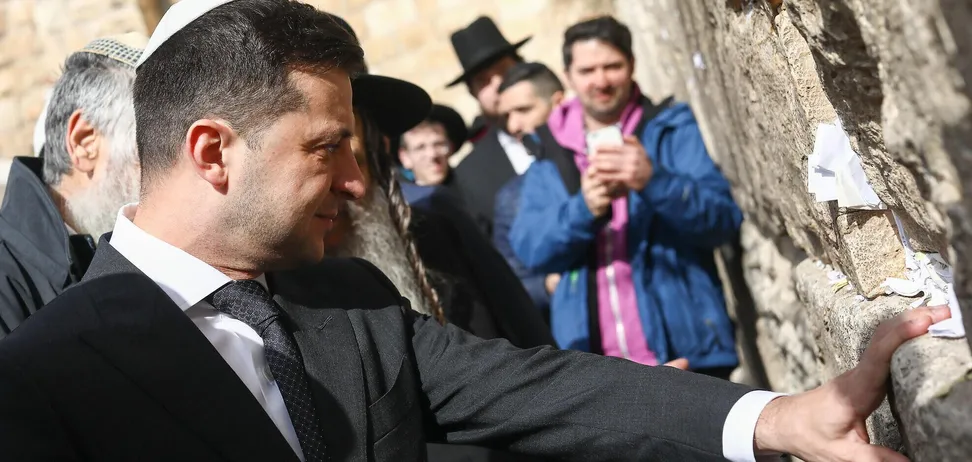
President Zelensky prayed for peace in Ukraine at the Wailing Wall in Jerusalem in 2020. Photo credit: President's Office.
The Kremlin presents the war to the Russian population as if this "special military operation" was a continuation of the fight of their grandfathers during World War II.
In addition, the goal of this "denazification" justified extraordinary repressive measures and cruelty in the name of eradicating absolute evil, namely Nazis.
However, Russian propaganda has failed to sell the "Nazis in Ukraine" narrative almost anywhere abroad. All of Moscow's former partners who fought Hitler have supported Kyiv in this war.
And the ethnic origin of President Zelensky made the thesis about the Nazi regime clumsy to say the least.
The Jerusalem Post has published its annual ranking of the world's most influential Jews. The 2022 list was topped by the leader of the Ukrainian nation, Volodymyr Zelensky, who featured on the cover of the magazine.
It quickly became apparent that by "denazification", Russians meant de-Ukrainization and genocide, something which they have in common with the original Nazis.
4. Atrocities in Bucha are staged
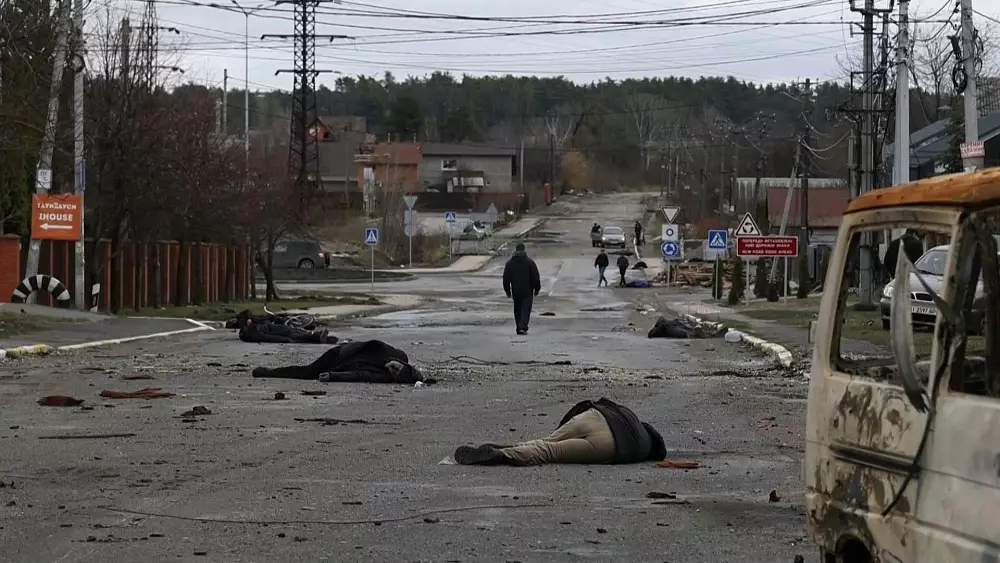
Liberated Bucha, Kyiv Region, corpses lying in the streets. Photo credit: Screenshot Ukrainian TV channel 1+1, April 2.
After the Russian military abandoned Bucha in March, the bodies of dead civilians were found in the city, several dozen lying directly in the street.
The Ukrainian prosecutor-general said that the bodies of 410 civilians had been accounted for in the liberated districts of Kyiv Region.
Human rights organizations have documented numerous cases of murder, rape, and other serious crimes committed in liberated territories.
Yet back in April the Russian Defense Ministry described the brutal murders of people in Bucha, Irpin, and Hostomel as fake and the live videos of dead Ukrainians lying on the streets of these towns as staged.
Russian propagandists deliberately show low-quality videos to pass them off as fakes, but experts have refuted all the Russia’s arguments made to support this.
There is ample evidence of atrocities committed by the Russian military in Bucha - bodies of victims, eyewitness accounts, satellite photos and images. Later, mass graves of civilians - bodies with signs of torture were discovered in Borodyanka, Kyiv Region, then in liberated Izyum, Kharkiv Region, in Kherson, where in addition to graves, many torture chambers were also found.
5. Russian blackmail
From time to time, senior Russian officials raise the topic of the risks of nuclear war: they declare the readiness of Russia’s deterrent forces, accuse the West of provocations, and issue statements assuring that they are not afraid of the worst scenario.
The Kremlin has sought to translate nuclear blackmail into the format of threats from alleged Ukrainian shelling of Russian-occupied nuclear power plants, and to accuse Kyiv of creating a "dirty bomb".
Battleground defeats and loss of occupied territories suffered by Russian forces have forced Russia to rattle its nuclear arsenal as the last argument as to why it cannot lose.
However, the Armed Forces of Ukraine have shown that the liberation of territories annexed by Russia is possible – the recent liberation of Kharkiv Region and Kherson is direct proof.
In selecting the arguments as to why the West should persuade Ukraine to surrender, the Kremlin has promoted the thesis about the threat to global food security due to the prolongation of the war.
The truth is that the threat of famine was created by Russia, whose navy blocked maritime grain exports from Ukrainian ports and whose soldiers have destroyed the agricultural sector of Ukraine.
However, Ukraine, supported by the UN, has found a way out through the grain agreement, which Russia had to join finding itself under international pressure.
Russia has traditionally tried to start a gas war against Europe in winter, blackmailing it by reducing or even stopping supplies.
However, it turns out that Russia is more dependent on the EU market than Europeans are on Russian gas.
As a result, Russian energy giant Gazprom has lost 80 percent of the European market, which cannot be compensated.
6. The Mother of all Lies – Ukraine Does Not Exist
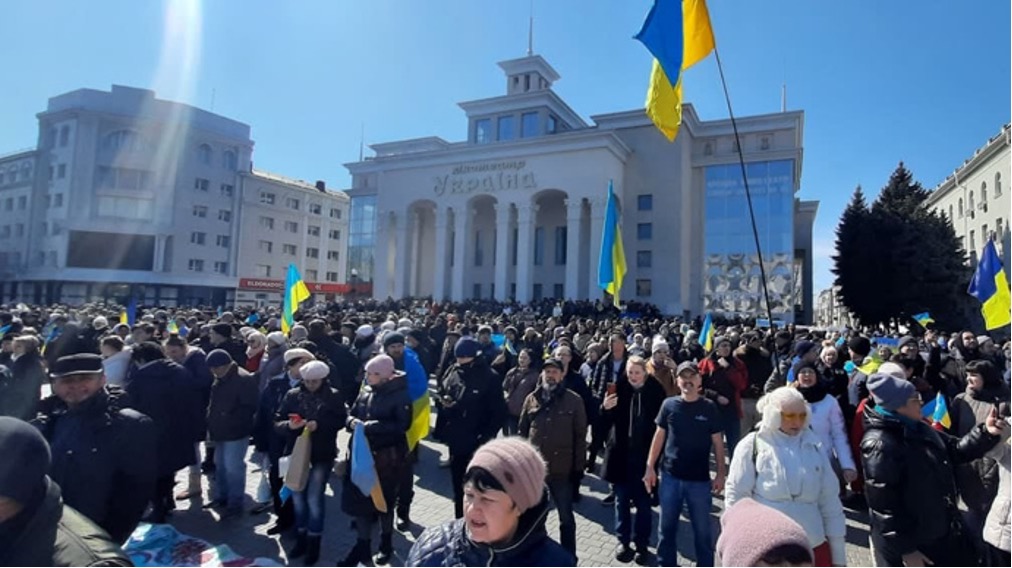 Thousands of people came out for a peaceful pro-Ukrainian demonstration, "Kherson is Ukraine," in occupied Kherson despite the risk of being shot by the Russian military on March 12. Source: Public Kherson
Thousands of people came out for a peaceful pro-Ukrainian demonstration, "Kherson is Ukraine," in occupied Kherson despite the risk of being shot by the Russian military on March 12. Source: Public Kherson
There is no Ukraine in reality, Putin constantly repeats. It is merely a Western ideological construct to undermine Russia and Moscow therefore needs to protect its own “Russian” people and lands.
There’s no real need to comment on this lunacy: the Ukrainian people, regardless of their linguistic, regional, ethnic or religious background have responded to this primitive slur by fighting heroically to defend their country and its democratic values and European self-identification.
No to Russian imperialism, autocracy and lies, they are saying clearly and firmly, and the world has heard them.
You can also highlight the text and press Ctrl + Enter


